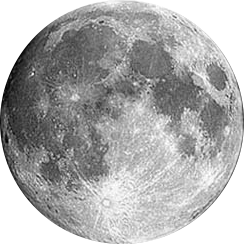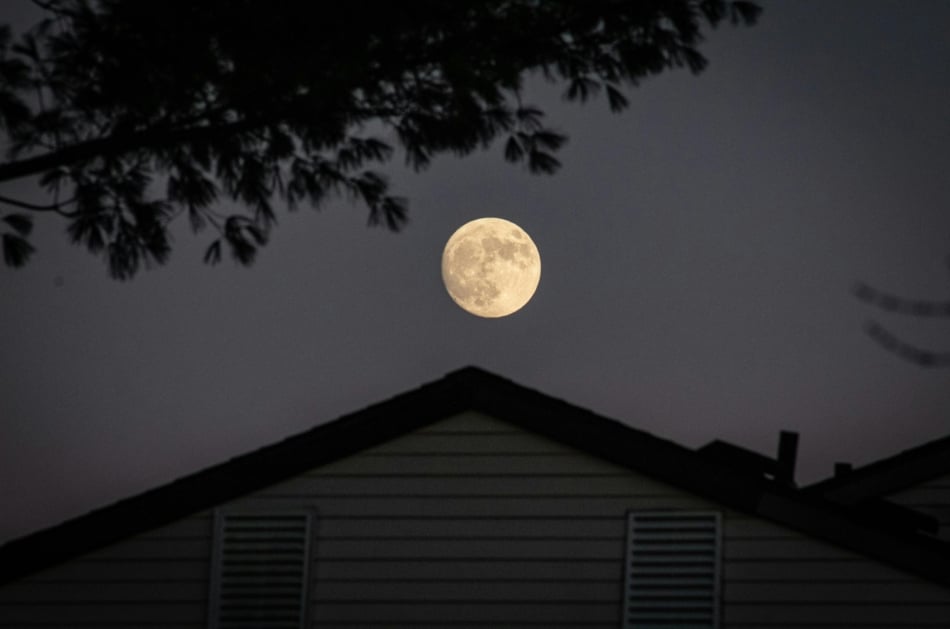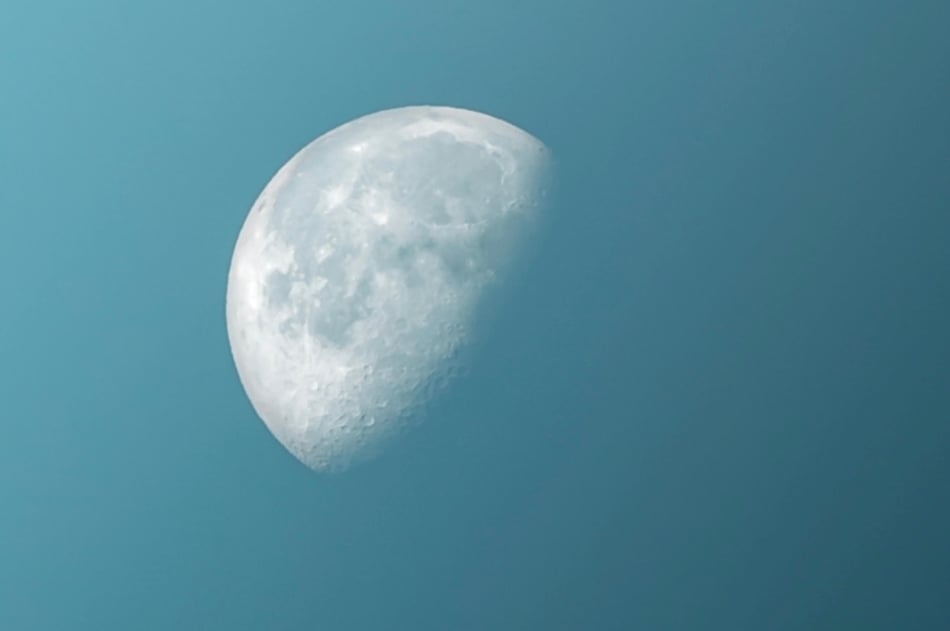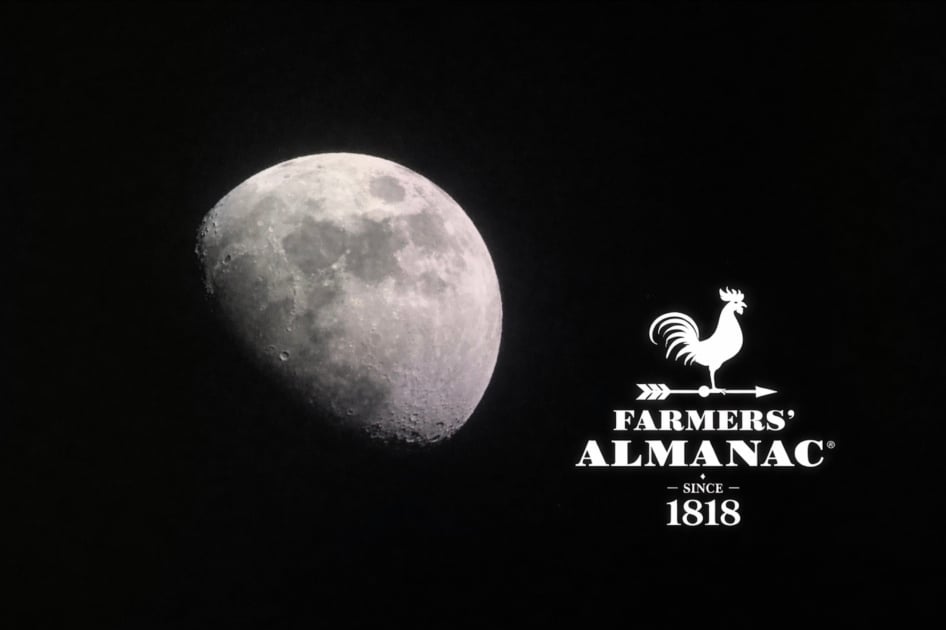Curious about the Moon phases for this month and next? Here are upcoming dates and times for each phase through the end of 2026. Please visit our Zodiac Calendar to see the Moon’s zodiac sign, which changes every 2-3 days on average.
🌑🌒🌓🌔🌕
Moon Phases Timeline — 2026 (EST / EDT)
🌕 JANUARY
- Jan 3 — 🌕 Full Wolf Moon (Supermoon) · 5:03 AM
- Jan 10 — 🌗 Last Quarter · 10:48 AM
- Jan 18 — 🌑 New Moon · 2:52 PM
- Jan 25 — 🌓 First Quarter · 11:47 PM
🌕 FEBRUARY
- Feb 1 — 🌕 Full Snow Moon · 5:09 PM
- Feb 9 — 🌗 Last Quarter · 7:43 AM
- Feb 17 — 🌑 New Moon (Annular Solar Eclipse) · 7:01 AM
- Feb 24 — 🌓 First Quarter · 7:27 AM
🌕 MARCH
- Mar 3 — 🌕 Full Worm Moon (Total Lunar Eclipse) · 6:38 AM
- Mar 11 — 🌗 Last Quarter · 5:38 AM
- Mar 18 — 🌑 New Moon · 9:23 PM
- Mar 25 — 🌓 First Quarter · 3:17 PM
🌕 APRIL
- Apr 1 — 🌕 Full Pink Moon · 10:12 PM
- Apr 10 — 🌗 Last Quarter · 12:51 AM
- Apr 17 — 🌑 New Moon · 7:52 AM
- Apr 23 — 🌓 First Quarter · 10:31 PM
🌕 MAY
- May 1 — 🌕 Full Flower Moon · 1:23 PM
- May 9 — 🌗 Last Quarter · 5:10 PM
- May 16 — 🌑 New Moon · 4:01 PM
- May 23 — 🌓 First Quarter · 7:11 AM
- May 31 — 🌕 Full Blue Moon · 4:45 AM
🌕 JUNE
- Jun 8 — 🌗 Last Quarter · 6:00 AM
- Jun 14 — 🌑 New Moon · 10:54 PM
- Jun 21 — 🌓 First Quarter · 5:55 PM
- Jun 29 — 🌕 Full Strawberry Moon · 7:56 PM
🌕 JULY
- Jul 7 — 🌗 Last Quarter · 3:29 PM
- Jul 14 — 🌑 New Moon · 5:43 AM
- Jul 21 — 🌓 First Quarter · 7:05 AM
- Jul 29 — 🌕 Full Buck Moon · 10:35 AM
🌕 AUGUST
- Aug 5 — 🌗 Last Quarter · 10:21 PM
- Aug 12 — 🌑 New Moon (Total Solar Eclipse) · 1:36 PM
- Aug 19 — 🌓 First Quarter · 10:46 PM
- Aug 28 — 🌕 Full Sturgeon Moon (Partial Lunar Eclipse) · 12:18 AM
🌕 SEPTEMBER
- Sep 4 — 🌗 Last Quarter · 3:51 AM
- Sep 10 — 🌑 New Moon · 11:27 PM
- Sep 18 — 🌓 First Quarter · 4:43 PM
- Sep 26 — 🌕 Full Harvest Moon · 12:49 PM
🌕 OCTOBER
- Oct 3 — 🌗 Last Quarter · 9:25 AM
- Oct 10 — 🌑 New Moon · 11:50 AM
- Oct 18 — 🌓 First Quarter · 12:12 PM
- Oct 26 — 🌕 Full Hunter’s Moon · 12:12 AM
🌕 NOVEMBER
- Nov 1 — 🌗 Last Quarter · 3:28 PM
- Nov 9 — 🌑 New Moon · 2:02 AM
- Nov 17 — 🌓 First Quarter · 6:48 AM
- Nov 24 — 🌕 Full Beaver Moon · 9:53 AM
🌕 DECEMBER
- Dec 1 — 🌗 Last Quarter · 1:08 AM
- Dec 8 — 🌑 New Moon · 7:52 PM
- Dec 17 — 🌓 First Quarter · 12:42 AM
- Dec 23 — 🌕 Full Cold Moon (Supermoon) · 8:28 PM
- Dec 30 — 🌗 Last Quarter · 1:59 PM

Waxing Gibbous
98% of Full

Any questions? Contact [email protected]

🌙 Moon Phases Explained
As the Moon orbits Earth, the amount of sunlight we see reflected from its surface changes. This creates a repeating lunar cycle lasting about 29.5 days, with eight distinct phases.
🌑 New Moon
The Moon sits between Earth and the Sun, with its illuminated side facing away from us.
- The Moon is usually invisible in the night sky
- Best time for stargazing due to dark skies
- Marks the beginning of a new lunar cycle
🌒 Waxing Crescent
A thin sliver of light appears on the Moon’s right side.
- The Moon is growing brighter each night (“waxing”)
- Visible shortly after sunset
- Symbolizes growth and momentum
🌓 First Quarter
Half of the Moon is illuminated on the right side.
- The Moon has completed one-quarter of its orbit
- Rises around midday, sets around midnight
- Excellent for viewing craters and surface detail
🌔 Waxing Gibbous
More than half of the Moon is lit, but it’s not yet full.
- The illuminated area continues to increase
- Bright and visible for much of the evening
- Often overlooked, but visually striking
🌕 Full Moon
The entire face of the Moon is illuminated.
- The Moon rises at sunset and sets at sunrise
- Appears largest and brightest in the sky
- Associated with tides, folklore, and named moons (Harvest Moon, Wolf Moon, etc.)
🌖 Waning Gibbous
The Moon begins to shrink, with light fading from the right side.
- “Waning” means the illumination is decreasing
- Rises later in the evening, sets in the morning
- Often visible in the early morning sky
🌗 Last Quarter
Half of the Moon is illuminated on the left side.
- Occurs about three weeks into the lunar cycle
- Rises around midnight, sets around noon
- Another excellent phase for observing shadows and terrain
🌘 Waning Crescent
Only a thin crescent remains, now on the left side.
- Visible just before sunrise
- Signals the end of the lunar cycle
- The Moon soon returns to New Moon and the cycle repeats
What causes the different Moon phases?
The Moon phase you see depends on where the Moon is in its orbit around Earth. The Moon doesn’t actually change shape and it doesn’t generate light of its own; it reflects the Sun’s light like a gigantic mirror. (Fun fact: Light travels 93 million miles from the Sun, bounces off the surface of the Moon, and then travels another 240,000 miles to reach your eyes.)
When the Moon is between the Sun and Earth, it is usually invisible. This is called a “New Moon.” After a day or so, the Moon begins to pass the Sun in its orbit. As it does, its right side becomes a crescent Moon.
The Moon continues to travel eastward in its orbit. As it does, its right side glows brighter over the course of the lunar month.
When the Moon has made one quarter (one-fourth) of its trip around the Earth, it reaches the “first quarter” phase. At this point, the Moon, and Earth form a right angle. In the days that follow, the Moon’s brightness continues growing, through the “waxing gibbous” phase, until it becomes full. Full Moons occur when the Moon is at the exact opposite side of the Earth as the Sun.
After the full Moon, the Moon is considered to be waning (diminishing in light). The Moon phases continue in reverse order, beginning with gibbous and ending with crescent. Then the cycle repeats again with the next New Moon.
The Moon is always illuminated from right to left over the course of the month. So if you happen to see a crescent on the right side, you know the Moon is waxing (heading towards a full Moon) and if you see a crescent on the left side, the Moon is waning (heading towards a New Moon phase).
The explanation above was provided by expert astronomer Dean Regas.
Join The Discussion
What are your favorite Moon phases?
Do you prefer a crescent Moon or a full Moon?
Have you used our Moon Phase Calendar to plan any activities?
Share with your community here in the comments below!


very helpful. thanks
Great info, Thanks!
Both crescent moon and full moon are beautiful in their own right.
Moon phases
Where are the astrological signs for the lunar phases???
Here’s a link Carol – https://www.farmersalmanac.com/calendar/zodiac-calendar
When did the dark phase of the moon become the “new” moon, and why?
In prehistoric times.
they are right as far as the waxing ang waning but how do you tell what sign the moon is in?
Hi LaTanyia, You may be interested in this article about “new” Moons: https://www.farmersalmanac.com/when-is-the-next-new-moon
It’s not. The new moon begins when the the light returns in the moon.
And when it is wholly extinguished, its light is consumed in heaven; and on the first day it is called the New Moon, for on that day
👉🏾light is received into it.👈🏾 ENOCH 78:14
Lots of good information with lots of stuff that make you think!!
I remember ever since I was young my grandma mentioning that it’s a full moon so she’ll get her hair cut.There wasn’t a discussion about it yet I remember that being said. Now in my forties , finally I understand why . And I believe the reasonings behind it because it seemed to be true as well as planting and gardening which she again didn’t say detail but mentioned certain ways best to be done during certain moon types. I wish it soaked in more but that’s why I’m here is to talk and learn the true ways. I’m open to any advice to do with planting of plants ,flowers,trees, veg. gardening & transferring, etc. . Even hair trimming, cutting, coloring. Thank you all for reading my short book above LOL
Hi Corey! Yes, we are here to help you discover the “Best Days” to do everything. Here is our Daily Planner that lists suggestions for each day – https://www.farmersalmanac.com/calendar – If you have any questions, leave another comment!
when is the best time to dig potatoes?
Strangely, on certain days I would find myself in the garden mood either cleaning or planting..just so happens those days would sync in the calendar for whatever I planted! So most who know me have said that I have a green thumb! Isn’t that strange? 🤔